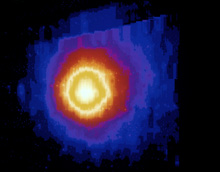Is good, good enough?
Do you strive for perfect or asses the risk and make a decision to go or not to go?
Would you sit on top of a roman candle like the Apollo Astronauts?
http://www.johnwyoung.com/as10/as10pg15.htm
http://www.nasm.si.edu/collections/imagery/apollo/AS11/a11av.htm
http://www.hq.nasa.gov/office/pao/History/alsj/a15/images15.html#Launch
There still is an International Space Station to complete and use in innovative ways.
Is that possible?
Can we really learn to live in space or will we need the protection of our
magnetosphere and be confined to the crib with our blanket pulled over our head?
http://lkellogg.vttoth.com/LarryRussellKellogg/colonies.html
http://members.aol.com/oscarcombs/settle.htm
Where do you put your resources?
What mail solicitations do you respond to?
Will there be a return on your investment or will it just be skimmed off by some opportunist?
Certainly lots of things to do here on Earth.
That takes interest and money too.
Enough to go around is a question that is hitting close to home. - LRK -
-----------------------------------------------------------
http://query.nytimes.com/gst/abstract.html?res=F70B1EF6385C0C7B8CDDAF0894DD404482
NATIONAL DESK | June 8, 2005, Wednesday
Scientific Group Criticizes NASA Budget Cuts
By WARREN E. LEARY (NYT) 406 words
Late Edition - Final , Section A , Page 16 , Column 4
ABSTRACT - American Geophysical Union warns that proposed NASA budget cuts for Earth and space science will decimate programs that are finally giving people an understanding of complex world on which they live; warns that US leadership in Earth and space science is at risk (S)
-----------------------------------------------------------
Going to space or doing things in space doesn't always meet with approval. Nuclear power supplies are feared as a souce of contaminents, leaving trash and cremates on the Moon sound like what we do here on Earth, and making holes in comets can get you sued. - LRK -
------------------------------------------------------------
http://seattletimes.nwsource.com/html/nationworld/2002347919_comet25.html
Saturday, June 25, 2005 - Page updated at 12:00 AM
Russian sues to stop NASA's comet blast
By Douglas Birch
The Baltimore Sun
MOSCOW — When NASA's Deep Impact spacecraft hurls a barrel-sized probe at the comet Tempel-1 millions of miles from Earth on July 4, Marina Bai of Moscow will take it very personally.
The 45-year-old mother of two is so upset about the scientific assault on the celestial body that she has taken the unusual step of suing the National Aeronautics and Space Administration in Moscow courts. Her lawsuit seeks to block the launch of the probe and to recover $311 million in "moral" damages.
Bai, a self-published author and spiritualist, said this week that she couldn't sleep after watching a television report about the Deep Impact mission, the work of a team of astronomers at the University of Maryland, when it was launched Jan. 12.
"Somewhere deep inside me, a voice told me the whole mission had to be stopped," she said in an interview. "I fear that it could have an impact on all humanity."
In court papers, Bai asserts that Deep Impact will "infringe upon my system of spiritual and life values, in particular on the values of every element of creation, upon the unacceptability of barbarically interfering with the natural life of the universe, and the violation of the natural balance of the universe."
Dolores Beasley, a spokeswoman for NASA, said it would be "inappropriate" to comment.
snip
------------------------------------------------------------
The Past, Present, and Future, a lot to consider.
If you know of others that would like to look up too,
let them know they are most welcome to join the lunar-update list. - LRK -
http://news.altair.com/mailman
Larry Kellogg
larry.kellogg at sbcglobal.net
https://news.altair.com
http://kelloggserialreports
http://lkellogg.vttoth.com
=============================================================
NASA chief: Shuttle is ready to go;
Administrator says chances of July launch look good
By John Kelly, Florida Today
FloridaToday.com
Posted Online: June 28, 2005
WASHINGTON - NASA Administrator Mike Griffin has decided to go
forward with the launch of the shuttle Discovery in July even though
the agency has not accomplished some safety reforms recommended by
Columbia accident investigators.
In testimony before the House Science Committee today, Griffin
acknowledged the agency can't eliminate all dangerous launch debris
or repair heat-shielding damage in orbit to the degree suggested by
the Columbia Accident Investigation Board.
However, Griffin said the agency has made enough progress since the
2003 catastrophe to reduce the risk of returning the shuttles to
space enough to justify launching now rather than later. Waiting
longer will not eliminate the danger, Griffin said.
"We must say we have reduced the risk due to debris to an acceptable
level or we must say that we don't ever want to fly the shuttle
again," Griffin said. "We do not have a better technical approach to
dealing with it than the one we have put forward."
Griffin's comments came one day after the independent Stafford-Covey
Return To Flight Task Group determined that NASA had met 12 of the 15
safety recommendations that the Columbia investigators said should be
complete before the shuttles fly again.
In a summary report delivered to Griffin this morning, the task group
said NASA did not fully satisfy the three most difficult and arguably
most important post-Columbia recommendations:
*prevent foam insulation and ice debris from shaking free of the
external fuel tank and hitting the orbiter during launch.
*strengthen the heat shield and windows to better withstand impacts
and survive atmospheric re-entry with minor damage.
*inspect the heat-shielding components in orbit and have tools on
board to allow spacewalking astronauts to repair damage.
"The ideal state would be to have no debris coming from the tank but
we've not been able to achieve that," Griffin said. "The ideal state
would be to have repair tools and techniques. We don't know how to do
that. We have spent quite a lot of money on trying to comply with the
recommendations but we don't know how to do it."
Griffin, an aerospace engineer who's authored a book on spacecraft
design, has sat in on more technical meetings than most predecessors
and participated in discussion and debate about the agency's progress
resolving the problems that doomed Columbia.
"I have a pretty good picture of where we are . . . and based on what
I know, we are ready to go," Griffin said. "The Flight Readiness
Review will either uncover an exception to that statement or endorse
it."
U.S. Rep. Sherwood Boehlert, R-N.Y., chairman of the House Science
Committee, said he was aware of the task group's determinations, but
stressed that he respected Griffin's expertise and would trust his
call on the issue of whether to fly this summer.
"That is a close decision and I am ready to abide by any decision
Administrator Griffin makes," Boehlert said.
Griffin was to leave the hearing, address NASA employees this
afternoon and then fly to Florida this evening so he can participate
in the two-day Flight Readiness Review beginning Wednesday at Kennedy
Space Center.
That meeting is where managers will go over all technical and safety
issues to determine whether Discovery is safe and ready to launch. At
the conclusion of the conference, the space agency aims to announce a
firm launch date between July 13 and July 31.
Griffin expressed optimism, saying that as far as processing the
vehicle goes, NASA is ready to launch Discovery soon.
"We have several days of slack available between today and a launch
on July 13," Griffin said. "We look like we're in pretty good shape."
Meanwhile, Griffin and Secretary of State Condoleezza Rice asked
Congress to amend a nuclear weapons law that bans the United States
from paying the Russians for services related to the International
Space Station. The Iran Nonproliferation Act of 2000 would prohibit
NASA from buying rides on Russia's Soyuz capsules unless the
President verifies Russia is preventing its scientists and engineers
from passing nuclear weapons technology to Iran.
The law exempted some initial flights of Soyuz, up through the spring
of next year. After that, the Russians have said the U.S. must pay to
fly NASA astronauts to or from the space station. Griffin testified
today that, if the law is not amended to allow NASA to purchase
additional Soyuz craft, American astronauts would not be able to
reside aboard the space station taxpayers built for them.
In recent months, the State Department and NASA have been working on
an amendment to the law that would let the U.S. purchase Russian
spacecraft while still pursuing the original goal of stopping Iran
from getting advanced arms technology.
Without the change, Griffin said, "the United States would not be
able to use the space station. We would not be allowed to have U.S.
astronauts on the station other than those times when the shuttle is
docked there."
U.S. Rep. Dana Rohrabacher, R-Calif., said he agreed that the law
could be adjusted to resolve NASA's crisis. Without the Soyuz,
American astronauts would have no method for crew escape in an
emergency even if the shuttles were used to take them up and back
from the outpost.
"It was a worthy goal," Rohrabacher said. "We tried to make sure we
used all of the leverage that we had to try to get them out of this
nuclear power plant in Iran." That effort failed and the limitations
the law places on NASA are no longer reasonable, he said. " …There is
no reason for us not to be realistic now."
=============================================================





No comments:
Post a Comment
Note: Only a member of this blog may post a comment.